
STUDIES IN PHILOSOPHY AND EDUCATION
Scope & Guideline
Transforming Educational Landscapes through Philosophical Inquiry
Introduction
Aims and Scopes
- Philosophical Foundations of Education:
Explores various philosophical traditions and their implications for education, including existentialism, pragmatism, phenomenology, and critical theory. - Ethics and Education:
Investigates ethical dilemmas in educational practices, emphasizing the moral responsibilities of educators and institutions in diverse contexts. - Critical Pedagogy and Social Justice:
Focuses on the role of education in promoting equity, inclusion, and social justice, examining how educational practices can challenge systemic inequalities. - Aesthetic and Sensory Pedagogy:
Emphasizes the significance of sensory experiences and aesthetic engagement in the learning process, exploring how these dimensions enrich educational practices. - Interdisciplinary Approaches:
Encourages interdisciplinary research that integrates insights from fields such as psychology, sociology, literature, and digital humanities into educational theory and practice. - Democratic Education:
Examines the principles of democracy in education, including student participation, deliberation, and the cultivation of democratic citizenship.
Trending and Emerging
- Digital Pedagogy and Technology Integration:
A growing focus on the role of digital technologies in education, particularly discussions on how tools like AI and online learning platforms affect pedagogical practices and student engagement. - Global and Cross-Cultural Education:
An increasing interest in global perspectives and cross-cultural approaches to education, highlighting the importance of understanding diverse educational contexts and practices. - Emotional and Affective Dimensions of Learning:
Emerging themes that explore the emotional and affective aspects of education, emphasizing how feelings and relationships influence learning experiences. - Decolonization and Anti-Racist Education:
A notable rise in discussions around decolonizing educational practices and curricula, focusing on anti-racist pedagogies and the inclusion of marginalized voices in education. - Environmental and Ecological Education:
A trend towards integrating environmental issues into educational discourse, reflecting a growing awareness of sustainability and ecological responsibility in educational contexts. - Philosophy of Education in Crisis Contexts:
Emerging discussions on how education can respond to crises, such as the COVID-19 pandemic, and the philosophical implications of these challenges for teaching and learning.
Declining or Waning
- Traditional Educational Theories:
There has been a decline in articles focusing solely on classical educational theories without integrating contemporary issues or critiques, suggesting a move towards more relevant and context-sensitive discussions. - Standardized Assessment and Performance Metrics:
Research centered on traditional methods of assessment and performance evaluation has decreased, as the focus shifts to more holistic and formative approaches. - Teacher-Centered Pedagogy:
Themes emphasizing teacher-centered approaches to education are less prevalent, indicating a growing interest in student agency and participatory methods. - Historical Perspectives on Education:
While historical analysis remains important, there is a reduced frequency of papers solely focused on historical educational practices without connecting them to current issues. - Disciplinary Boundaries in Education:
The strict adherence to disciplinary boundaries in educational research is fading, as interdisciplinary and transdisciplinary approaches gain traction.
Similar Journals
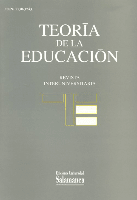
Teoria de la Educacion
Bridging Theory and Practice in Education and PhilosophyTeoria de la Educacion is a leading academic journal published by EDICIONES UNIV SALAMANCA, specializing in the fields of Education and Philosophy. With an impactful history since its inception in 1986, the journal operates under an open-access model, ensuring that vital research reaches a broad audience without financial barriers. Based in Spain, this journal not only boasts high visibility with its Q1 rankings in both Education and Philosophy but also achieves notable standings in Scopus rankings, placing in the 96th percentile in Philosophy and the 80th in Education. The scope of the journal encompasses various educational theories, methodologies, and philosophical underpinnings that shape contemporary discourse, making it an invaluable resource for researchers, professionals, and students alike who seek to understand and innovate within these crucial disciplines. By bridging theory and practice, Teoria de la Educacion fosters critical dialogue and advances scholarly insights, solidifying its role as a keystone publication within the academic landscape.
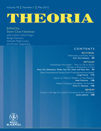
Theoria-A Swedish Journal of Philosophy
Advancing the Boundaries of Philosophical ThoughtTheoria - A Swedish Journal of Philosophy, published by WILEY, stands as a significant contributor to the realm of philosophical discourse since its inception in 1935, with a continued commitment to advancing scholarly conversation up to 2024. With its ISSN 0040-5825 and E-ISSN 1755-2567, the journal holds a prestigious position in the field, ranking in Q2 among philosophy journals and achieving an impressive 66th percentile ranking in the Scopus Arts and Humanities category. Although it does not currently provide Open Access options, Theoria remains a vital resource for researchers, professionals, and students seeking in-depth analyses and innovative perspectives within contemporary philosophy. Its central objective is to foster rigorous academic dialogue that explores diverse philosophical inquiries, making it an essential platform for those invested in the pursuit of knowledge and critical thought.

Kalagatos-Revista de Filosofia
Empowering Research and Reflection in the Philosophical RealmKalagatos-Revista de Filosofia is a distinguished academic journal published by UNIV ESTADUAL CEARA-UECE, focusing on a broad spectrum of philosophical inquiries and scholarly discussions. With an ISSN of 1808-107X and an E-ISSN of 1984-9206, this Open Access journal has been dedicated to disseminating high-quality research and fostering critical thought in the field of philosophy since its inception in 2004. Positioned as a vital resource for researchers, professionals, and students alike, Kalagatos encourages dialogues that traverse traditional boundaries in philosophical discourse. With its commitment to accessibility and quality, the journal plays a pivotal role in contributing to the philosophical landscape, making knowledge available to a global audience. The journal seeks to publish original research articles, reviews, and essays that address contemporary and historical philosophical challenges, nurturing a vibrant academic community engaged in meaningful exploration and reflection.
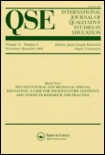
International Journal of Qualitative Studies in Education
Exploring the Depths of Educational Inquiry.Welcome to the International Journal of Qualitative Studies in Education, a prestigious publication in the field of education, managed by Routledge Journals, Taylor & Francis Ltd. With a strong emphasis on qualitative methodologies, this journal serves as a critical platform for researchers, educators, and practitioners, providing insightful analyses and innovative approaches to educational inquiry since its inception in 1988. Recognized within the Q2 category in Education as of 2023, it holds an impressive Scopus rank of 570 out of 1543, reflecting its significant impact and relevance in social sciences and education research. Although it does not offer open access, the journal's rich content contributes to the advancement of qualitative research, encouraging discourse that shapes contemporary educational practices. With a commitment to rigorous scholarly standards, the International Journal of Qualitative Studies in Education aims to stimulate critical dialogue and foster community among researchers, professionals, and students seeking to deepen their understanding of qualitative research and its applications in the rapidly evolving educational landscape.

Synesis
Connecting Researchers for a Brighter Academic FutureSynesis is a distinguished academic journal published by UNIV CATOLICA PETROPOLIS, renowned for its commitment to advancing knowledge across a broad spectrum of disciplines, predominantly in the fields of social sciences and humanities. Operating under the ISSN 1678-6785 and E-ISSN 1984-6754, this journal provides a critical platform for researchers, professionals, and students to share original research articles, reviews, and scholarly discussions that contribute to the ongoing dialogue in these areas. Although it operates under a traditional access model, Synesis endeavors to maintain high quality and rigor in the peer-review process, ensuring that published works meet the highest academic standards. With its solid foundation laid in the intellectual hubs of Brazil, Synesis plays a vital role in fostering international collaborations and enhancing the visibility of Brazilian research on the global stage. Researchers seeking to disseminate their findings in a respected forum will find Synesis an invaluable outlet for their work.

Open Insight
Innovating Ideas, Expanding PerspectivesOpen Insight is a prominent academic journal dedicated to the field of philosophy, published by the esteemed CENTRO INVESTIGACION SOCIAL AVANZADA, DIV FILOSOFIA in Mexico. Since its inception in 2017, Open Insight has been a vital platform for the dissemination of innovative philosophical discourse, bridging the gap between theoretical exploration and practical application in contemporary thought. With an ISSN of 2007-2406 and an E-ISSN of 2395-8936, this journal embraces a rigorous peer-review process and is committed to open access principles, ensuring the widest possible reach and impact of published research. Although currently positioned in the Q4 category and ranked 615 out of 806 in the Scopus Arts and Humanities (Philosophy) category, the journal actively encourages submissions that challenge conventional boundaries and inspire new avenues of inquiry. Researchers, educators, and students are invited to contribute their work, investigate philosophical dilemmas, and engage in meaningful discussions that resonate within the academic community and beyond.
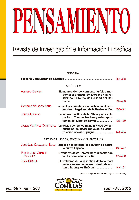
PENSAMIENTO
Connecting Minds Through Philosophical ExplorationPENSAMIENTO is a distinguished journal published by the Universidad Pontificia Comillas Madrid, Faculty of Philosophy, providing a platform for scholarly discourse in the field of philosophy. With its ISSN 0031-4749 and E-ISSN 2386-5822, the journal has embraced Open Access since 2016, promoting wider dissemination of philosophical research and thought. Located in Spain, it has established itself as a vital resource for academics, researchers, and students interested in contemporary philosophical inquiries and discussions. As of 2023, PENSAMIENTO is ranked Q3 in the Arts and Humanities, specifically within the Philosophy category, highlighting its emerging impact in the scholarly community with a Scopus rank of #575 out of 806, placing it in the 28th percentile. With its coverage spanning from 2002 to 2024, PENSAMIENTO is committed to contributing to the ongoing evolution of philosophical thought and ensuring that fresh perspectives can thrive within academia.
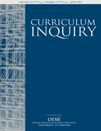
CURRICULUM INQUIRY
Transforming Learning Through Rigorous ResearchCURRICULUM INQUIRY is a prestigious academic journal published by Taylor & Francis Ltd, focusing on the dynamic field of education. Since its inception in 1976, this journal has served as a critical platform for researchers and practitioners alike to explore and interrogate various aspects of curriculum development and implementation. With an impressive Scopus ranking placing it at #502 out of 1543 in the Social Sciences Education category, it stands in the 67th percentile of its peers, reflecting its significant impact and relevance in the education sector. The journal is categorized in the Q2 quartile, further demonstrating its scholarly importance. Although it does not currently offer Open Access, CURRICULUM INQUIRY remains dedicated to advancing the discourse surrounding educational practices through rigorous peer-reviewed articles, critical reviews, and innovative research findings. Positioned for continued excellence through 2024 and beyond, this journal is essential reading for educators, policy-makers, and students invested in curriculum studies. For more information, readers can explore its comprehensive collections designed to stimulate critical thinking and pedagogical innovation.

Paideusis-The Journal of the Canadian Philosophy of Education Society
Challenging Perspectives, Shaping FuturesPaideusis - The Journal of the Canadian Philosophy of Education Society serves as a vital platform for scholarly discussion and inquiry within the field of philosophy of education. Published by the Canadian Philosophy of Education Society (CPES) and embracing an Open Access model since 1987, this journal fosters an inclusive environment for researchers, educators, and students seeking to engage with contemporary educational theories and practices. With an emphasis on philosophical reflection and critical analysis, Paideusis invites contributions that challenge and extend our understanding of educational paradigms, making it a crucial resource for those committed to advancing discourse in education. The journal not only aims to promote intellectual engagement but also to cultivate a community where new ideas can flourish, ultimately shaping the future of educational thought and practice.
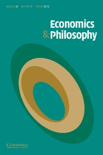
ECONOMICS AND PHILOSOPHY
Navigating the Complexities of Thought and Economics.ECONOMICS AND PHILOSOPHY is a distinguished journal published by Cambridge University Press, dedicated to the interdisciplinary study that bridges the gap between economic theories and philosophical discourse. With an ISSN of 0266-2671 and an E-ISSN of 1474-0028, this journal has been a critical resource for scholars since its inception in 1985, evolving continually to encompass contemporary issues and methodologies through to 2024. The journal holds a Q3 ranking in Economics and Econometrics and an impressive Q1 ranking in Philosophy for 2023, as per its category quartiles. Additionally, it ranks 123 out of 806 in the Arts and Humanities – Philosophy category, reflecting its high impact within the philosophical community. While it does not currently offer open access, the journal remains an essential platform for researchers, professionals, and students who seek to delve into the philosophical implications of economic thought and practice. In an era where economic decisions profoundly influence global society, ECONOMICS AND PHILOSOPHY plays a vital role in fostering critical dialogue and advancing scholarly insight.